How to Fix Your Anxiety
Apr 24, 2023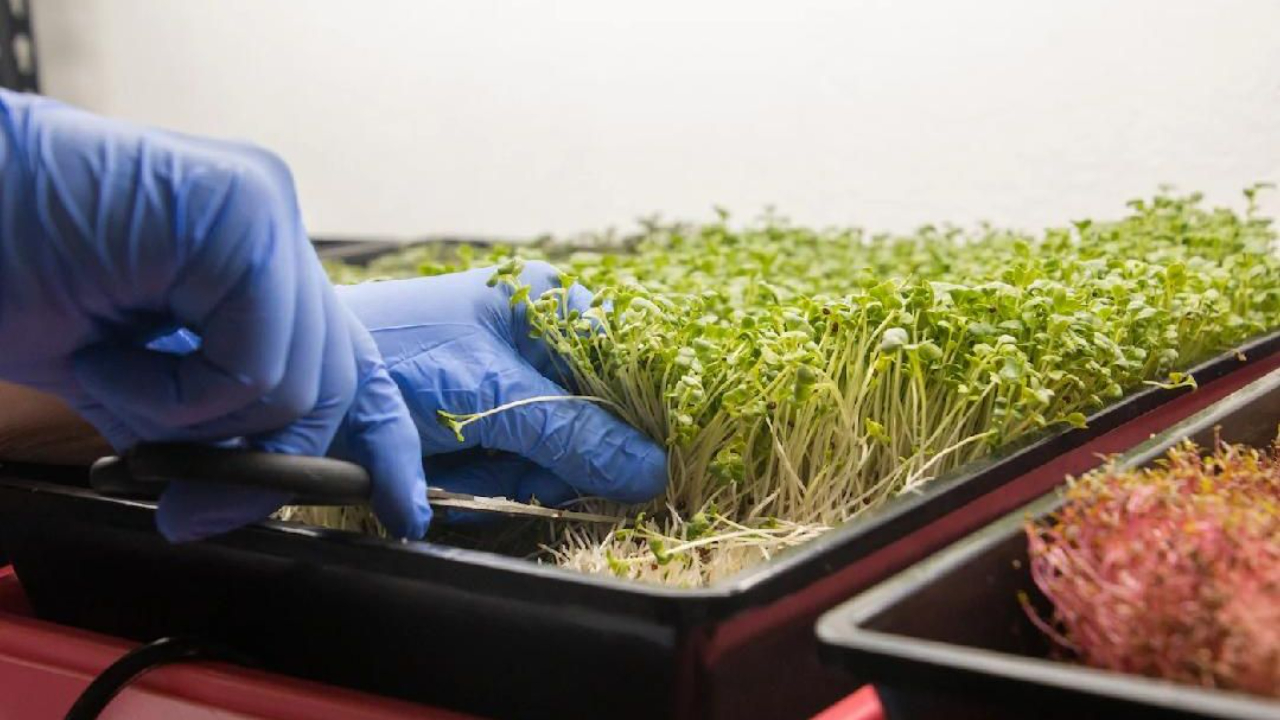
By Liana Werner-Gray
You fix your anxiety first by knowing the cause (and it may surprise you), and secondly knowing the solution for this cause. A solution that has worked for tens of thousands of people. Why haven’t you heard of it yet? Maybe you have and just need to be reminded again, or maybe this is the first you are learning about it and that is because it’s not mainstream news yet. It’s been studied for over thirty years by top doctors and researchers including at John Hopkins University, but the truth is the media doesn’t make money off selling a vegetable. I’m glad you are here, you are about to learn something new so that you can too be anxiety free.
Anxiety is thought to be caused by a myriad of things however when we break it down it’s quite simple, every root cause of it is here:
- Anxiogenic foods: Foods that produce anxiety are known as anxiogenic foods. These trigger anxiety straight away because of how they upset the nervous system. Poor diet is linked to anxiety and depression. Studies have shown that people with mood disorders often have diets that are low in fruits and vegetables and high in fat and sugar.3
- Nutritional deficiency: The body needs proper levels of certain vitamins and minerals to function in harmony; they are fundamental for our neurotransmitters. If you are anxious, you may also be deficient in magnesium, folate, zinc, amino acids, omega-3 fatty acids, vitamin D, B-complex vitamins, iron, iodine, and selenium.
- Glycemic imbalance: Foods that are high on the glycemic index (GI) raise your blood sugar rapidly. Common culprits are white bread, soda, and sugary foods. A “high GI” diet may worsen your mood.5 If you eat too much refined sugar for too many years, this can cause an imbalance.
- Obesity: Obesity is an underlying risk factor for many chronic health conditions and has been associated with increased oxidative stress. Good news: I provide a tone of recipes on this website and in my books that will help you achieve and maintain a healthy body composition.
- Lack of sleep/insomnia: Sleep is like food. It nourishes our bodies and restores them. A lack of sleep is both a contributing factor to, and a symptom of, anxiety.
- Adrenal “burnout” or fatigue: When the adrenal glands are spent of their resources and subsequently unable to provide adequate quantities of hormones, primarily cortisol, to respond to our routine needs for them, we experience adrenal fatigue. This condition may be due to chronic stress (which uses up reserves of adrenal hormones) or infections that interfere with production of adrenal hormones.
- Sedentary lifestyle: Being sedentary and prolonged sitting time puts us at higher risk for anxiety, according to a meta-analysis of nine studies. One theory is that a sedentary lifestyle causes central nervous system arousal, sleep disturbances, or poor metabolic health, leading to anxiety 7
- Drug and alcohol abuse: Substance abuse can intensify feelings of sadness, hopelessness, and loneliness, and also puts oxidative stress on the body.
- Nicotine use: Nicotine is naturally occurring in plants of the nightshade family, which includes tobacco (Nicotiana tabacum). While it has some therapeutic benefits, it’s highly addictive and can cause withdrawal when you stop using it. One study found that people with anxiety often self-medicate with nicotine because it eases some symptoms in the short term, but long-term usage “leads to increased baseline severity of anxiety disorder symptoms.”8
- Constant pressure/exposure to emotional stress/lack of spirituality: Aside from the biological causes of anxiety, such as nutritional deficiencies, anxiety can also be the result of psychological stress from constant abuse, unresolved childhood trauma, not being loved by your parents, financial hardship, relationship conflicts, sudden loss, and circumstances that are hard to accept.
- Prolonged periods of stress, such as you might experience on the job or while getting a divorce, can deplete your level of neurotransmitters and cortisol. Having an elevated level of corticotropin-releasing hormone is the main cause of our depressive and anxious symptoms.10 High, prolonged cortisol releases cause anxiety and fatigue and will interfere with the body’s ability to heal. Lack of spirituality is said to cause excess stress in the body and mind, as people with faith are able to offload some of their stresses and not let cortisol build up.
- Our bodies need to be able to release cortisol to survive, because cortisol helps control blood pressure, metabolize glucose (for energy), and reduce inflammation. The key to restoring cortisol levels naturally is to shift your body from its stress response to its relaxation response and to nourish it with the right foods and possibly supplements.
- Oxidative stress (free radical damage): Studies reveal that oxidative stress is associated with numerous psychiatric troubles, including pathologically high anxiety.11 The production of unstable molecules known as free radicals can be detrimental to our cells, inducing damage to our DNA and RNA. Free radicals contain oxygen that is missing an electron and wants to steal one from other molecules, such as the lipids in cellular membranes. It is a key factor in the aging process.
- Inflammation: Researchers have established links between anxiety and inflammation as well as the reverse. Associations have also been made between reduction of anxiety and anti-inflammatory dietary patterns, such as the high intake of fruits and vegetables.13
- Cognitive decline: Elderly people may feel anxious when their cognitive function is reduced.14 Dementia is also associated with alterations of brain chemistry. It’s too complex a subject to explore in depth here, but our best chance of maintaining good cognitive function is to take care of our brains when we’re young.
- Poor gut health: The gut and brain are interconnected. Some neurotransmitters, such as serotonin, are “manufactured” in the intestines, and water-soluble vitamins are synthesized by our symbiotic gut bacteria (aka probiotics). If the gut is not functioning optimally, the body and brain are not properly nourished. An unhappy gut equals an unhappy nervous system and a brain that is not energized.
- Long periods of intermittent fasting: I was shocked to discover this cause of anxiety because so many people have gotten into fasting these days and so many experts recommend it. Research has found that intermittent fasting does offer some health benefits; however, depriving yourself of food for an extended period of time can raise your levels of cortisol, the main stress hormone.15
- Other diseases and suffering: Living with chronic panic, constant headaches and migraines, asthma, irritable bowel syndrome (IBS), cancer, and so on can cause stress and anxiety. But one’s mood can also worsen the outcome of many of these conditions as well.16
- Antidepressants and antianxiety medication: This information may be shocking to you. It was to me. Personally, I believe medication can be helpful for some people in some situations. However, many drugs have been shown to worsen anxiety and depression, as a side effect. Practice Guideline for the Patients with MDD (major depressive disorder), released by American Psychiatric Association, says that medication has limitations.

To read about more of these causes, I elaborate in more detail in my book Anxiety Free with Food.
Regardless of the cause, the nervous system needs nourishment, just like every system in your body. Our nervous system is often overlooked and malnourished. It needs particular things in order to function, to heal and to maintain optimal nervous system health.
Now I will tell you how you can fix your nervous system with 6 steps that I personally did to heal and now maintain excellent health – anxiety free. Nutritional strategies should be used as complements to receiving health care from providers such as physicians and counselors.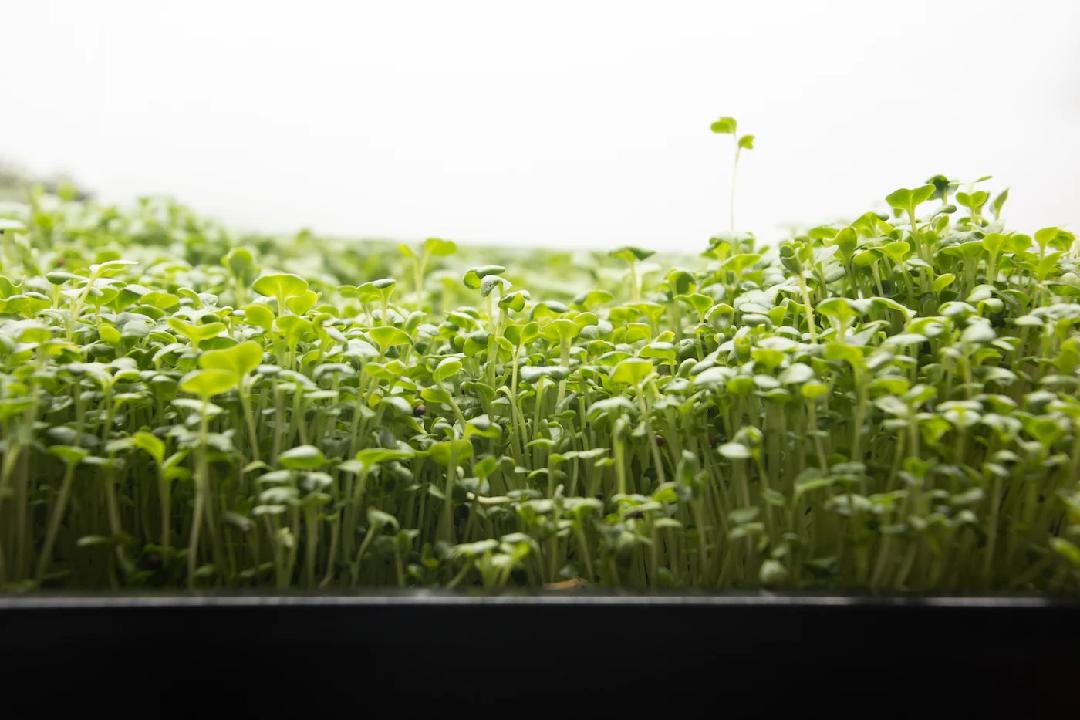
#1. Eat to Preserve Gut Health and Establish a Healthy Microbiome with Sulforaphane
Good gut health is everything! The brain-gut relationship determines a lot when it comes to anxiety. For good gut health, we need good bacteria living in our systems. The presence and type of microorganisms influence what the gut is able to digest and absorb, and also affect the degree of inflammation throughout the body. This, in turn, contributes to our moods and energy level. The biochemical relationship and signaling that goes on between the cognitive and emotional centers in the brain and the gastrointestinal tract is known as the gut-brain axis.
The importance of the gut-brain connection is also gaining traction among mental health researchers because of multiple studies that show people with anxiety have a different gut microbiome than those who do not!19 Furthermore, according to researchers at RMIT University in Melbourne, Australia, “An influence of gut microbiota on behaviour is becoming increasingly evident, as is the extension to effects on tryptophan and serotonin metabolism. There is regulation of tryptophan and serotonin in the gut by the resident microbiota, and recent studies show that low-to-no gut microbiota increases levels of tryptophan and serotonin and modifies central higher order behaviour.”20
Microbiome is a term that means the entire balance of microorganisms in a particular environment. In regard to the gut microbiome, as defined by molecular biologist Joshua Lederberg, it is defined as the totality of microorganisms, including bacteria, viruses, protozoa, and fungi, and their collective genetic material present in the gastrointestinal tract.21
This information about anxiety and gut health is so empowering to me; as someone who has suffered anxiety, I didn’t know I was at a disadvantage because my microbiome was not right. I had no clue that this meant I would be deficient in some essential nutrients! Among other things gut microbes do is to synthesize vitamins from our food—and make hundreds of neurotransmitters, including 90 to 95 percent of the serotonin the body uses. Serotonin is involved in basic physiological processes like learning, memory, mood, and sleep.22 As soon as we can replenish this, we can start to feel a whole lot better.
To me, this suggests we ought to help out our guts and feed them the right things to balance the gut microbiome. And it raises an interesting question: Which comes first, an unhealthy gut (due to poor eating and stress) or anxiety (which causes an unhealthy gut)?
An example of gut-brain communication being a two-way street may be irritable bowel syndrome (IBS). There have been cases where IBS causes anxiety and cases where anxiety causes IBS! IBS symptoms can include abdominal pain, bloating, gas, and other digestion issues.
What’s interesting is that for many years the medical field did not fully acknowledge the connection between mood and food. But lately, things have changed, and nobody denies it anymore. “Put simply, what you eat directly affects the structure and function of your brain and, ultimately, your mood,” says Eva Selhub, M.D., a contributing editor for the Harvard Health Blog. “Like an expensive car, your brain functions best when it gets only premium fuel.” Meaning our brain functions best when we feed it quality food. She continues, “Unfortunately, just like an expensive car, your brain can be damaged if you ingest anything other than premium fuel. If substances from ‘low-premium’ fuel (such as what you get from processed or refined foods) get to the brain, it has little ability to get rid of them.”23
Eating more complex carbs (whole grains, vegetables, and fruits) and fewer simple carbs (foods containing refined sugar and white flour) can contribute to better gut health. Also, because complex carbohydrates are metabolized more slowly, they help us maintain an even blood sugar level, which gives us a calmer feeling.
You can help replenish the good bacteria in your microbiome through probiotic foods and supplements. You get probiotics naturally when you eat fermented foods like vegetables, cucumbers, pickles, sauerkraut, and kimchi (just make sure they don’t have sugar and preservatives added). Kombucha, miso, tempeh, and sourdough contain probiotics. Probiotics are also present in raw milk and raw or fermented milk products, including cheese, kefir, and yogurt. It’s important to note, however, that probiotics are destroyed by pasteurization, so be aware when choosing your yogurt and other similar foods.24
Personally, I now take probiotic supplements daily to help maintain the quality of my gut microbiome. I could also recommend many different foods and supplements to you, but to prevent overwhelming, if I had to pick the one supplement I want you to focus on is the Broc Shot. Rather than take 10 different supplements to cultivate a healthy gut microbiome, you can take just one every single day. Each Broc Shot ensures 15mg of Sulforaphane for real benefits – in days, not weeks. Guaranteed.
Use my code: LIANA for 15% off at BrocShot.com and start cultivating your healthy gut for an anxiety free life today.
I feel this helps so much. I feel so much happier and truly more peaceful having a healthy gut. Science seems to be coming in that backs up this strategy. In fact, one systematic review in 2019 examined studies that treated anxiety through regulating the microbiome, either through probiotic use or dietary methods. The researchers found that more than half of the studies “showed that regulating intestinal flora can effectively improve anxiety symptoms.” Most impressive to me was that “80 percent of studies that conducted the non-probiotic interventions were effective.” They concluded, “In the clinical treatment of anxiety symptoms, in addition to the use of psychiatric drugs for treatment, we can also consider regulating intestinal flora to alleviate anxiety symptoms. Especially for patients with somatic diseases who are not suitable for the application of psychiatric drugs for anxiety treatment, probiotic methods and/or non-probiotic ways . . . can be applied flexibly according to clinical conditions.”25
Another study showed increasing evidence that Sulforaphane (SFN) produces antidepressant- and anxiolytic-like (anxiety reducing) effects in adult mice. The study Repeated SFN administration (10 mg/kg, i.p.) significantly decreased the immobility time in the forced swimming test. These findings demonstrated that SFN has antidepressant- and anxiolytic-like activities in stressed mice model of depression, which likely occurs by inhibiting the hypothalamic-pituitary-adrenal (HPA) axis and inflammatory response to stress. These data support further exploration for developing SFN as a novel agent to treat depression and anxiety disorders. This is why I consume Broc Shots daily to give my body this daily defense mechanism against stress.
#2. Eat and Drink Only Nontoxic Foods and Beverages—and Do a Detox, If Necessary
If you know or guess that your body is overloaded with toxins, a detox is a good idea. You would throw out a bucket of dirty water entirely before you began adding clean water to it, wouldn’t you?
I suggest doing a full-body detox, which includes a gut cleanse and liver cleanse, so you can lower the toxic burden in the body, give the lymphatic system a chance to restore itself, and let the gut heal so it can absorb nutrients properly. A toxic buildup can lead to anxiety, depression, and fatigue because your gut can’t properly absorb the nutrients you are giving it.
#3. Eat to Replenish Your Neurotransmitters
You want to be sure to eat foods that give your brain plentiful reserves of neurotransmitters, chiefly serotonin, dopamine, and gamma-aminobutyric acid (GABA).
- Serotonin.
- Dopamine.
- GABA.
#4. Eat to Overcome Nutritional Deficiencies
Nutritional deficiencies can mean your brain does not have the building blocks it needs to function optimally. You need amino acids, which come from protein, to build a healthy body. Also, several of the B-complex vitamins, including thiamin, riboflavin, niacin, vitamin B6, folate, and vitamin B12, are needed as cofactors for the synthesis of neurotransmitters in the gut.
#5. Eat More Magnesium-Rich Foods
One of the causes of anxiety is being deficient in magnesium. You could get a blood test if you aren’t sure of your own levels. The anxiolytic potential of magnesium has been demonstrated in studies. Magnesium modulates activity in the hypothalamic-pituitary-adrenal axis, which is a central communication highway for the stress response system.
#6. Eat More Omega-3 Fats
One of the most common causes of anxiety is being deficient in omega-3 fatty acids. So, make sure you are sufficient! Omega-3 fatty acids contain docosahexaenoic acid (DHA), alpha-lipoic acid (ALA), and eicosapentaenoic acid (EPA). DHA is an omega-3 fatty acid that is a primary structural component of the human brain, cerebral cortex, skin, and retina, and its deficiency is linked to several neurocognitive disorders and behaviors linked to anxiety and depression.39 Notably, low levels of DHA are associated with generalized anxiety,40 whereas supplementation with DHA has been shown to have anxiolytic effects.41
#7. Eat More Antioxidants
Researchers at the State of University of New York at Buffalo found that anxiety are associated with a low antioxidant state in the body. Furthermore, antioxidants elevate mood immediately and provide long-lasting health!43
#8. Eat More Plant-Based Foods—Raw Fruits and Vegetables, Especially
We cannot go wrong with a higher plant-based intake that includes vegetables, fruits, nuts, seeds, herbs, and spices. Studies have shown that consuming more plant-based ingredients reduces anxiety and depression because they contain a wide variety of micronutrients critical to physical and mental function, as well as complex carbs and fiber. Plants also help us to stay well hydrated.
#9. Eat to Reduce Inflammation
Oxidation damages the body. Inflammation is the body’s response to repair the damage—and it can get out of control. It’s been shown that inflammation in the body causes anxiety but also that anxiety causes inflammation.53
When you eat foods high in antioxidants, magnesium, omega-3 fatty acids, and amino acids, and you cut toxic foods like cakes, cookies, pastries, and products with sugar and/or additives out of your diet, you will be reducing inflammation effortlessly. The recipes in this book are all anti-inflammatory. If it comes from nature, an ingredient does not usually cause inflammation.
A powerful way to reduce inflammation in your body immediately is to consume sulforaphane daily – which is why I take a Broc Shot daily!
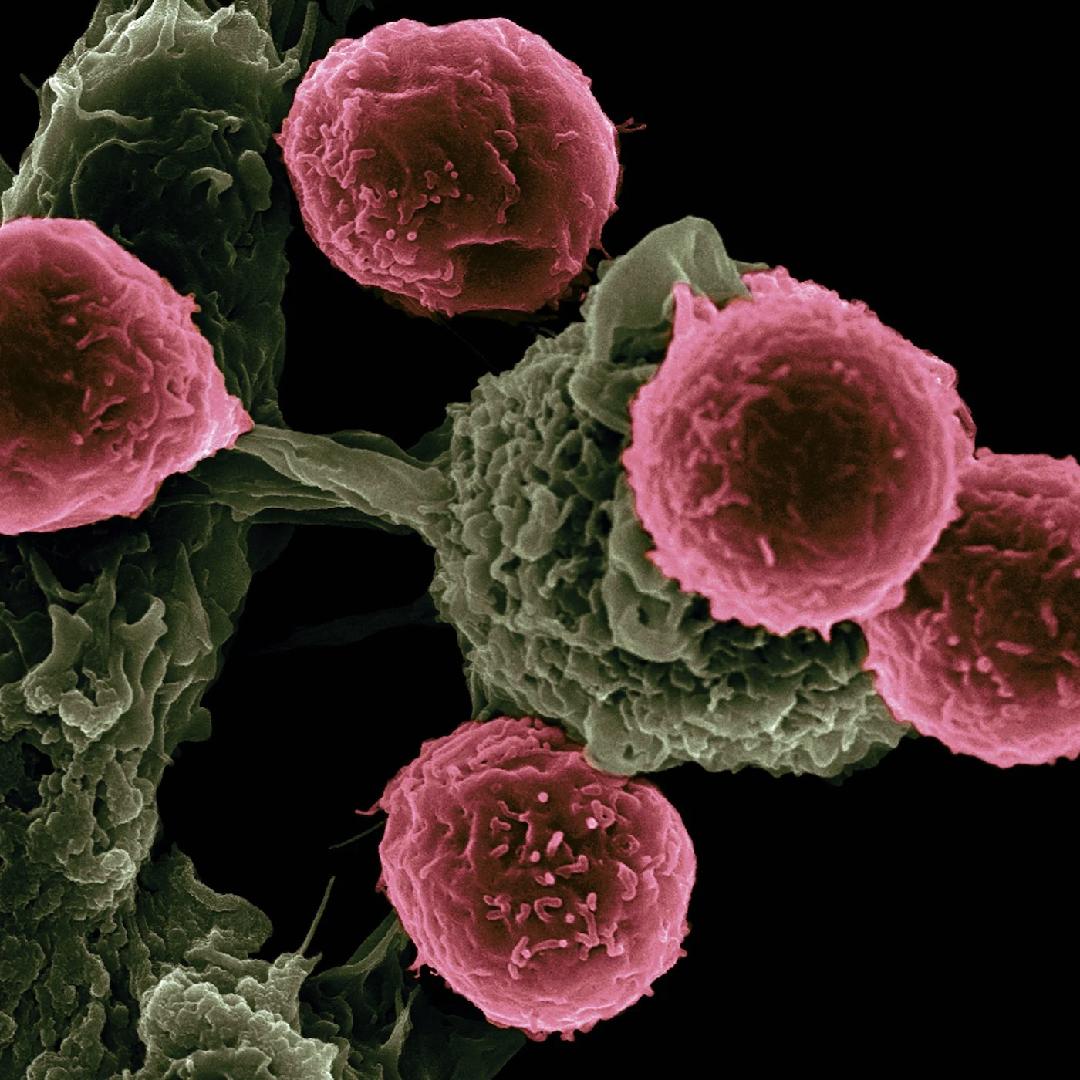
What’s the Science?
The Amos Institute broke it down for us.“Isothiocyanates are any group of compounds that contain the chemical group N=C=S (nitrogen = carbon = sulfur; double-bonded); sulforaphane has one of these groups in its chemical structure and is therefore a part of the isothiocyanate family. Isothiocyanates are the broken down components of glucosinolates, a natural component of pungent plants that adds its bitter flavor to cruciferous vegetables. Glucosinolates are broken down through an enzyme called myrosinase, an enzyme activated when cruciferous plant tissue is chewed, crushed, or chopped and becomes inactive from high heat or extended periods of boiling. If cooking our cruciferous inactivates these compounds, is it really available to our bodies? Aside from activation when we prep/cut our vegetables, these isothiocyanates can also be broken down by bacteria in our gut micriobiota and absorbed in the colon (Luang-In et al., 2014). To simplify, just don’t overcook these vegetables.” That’s also why taking a Broc shot is effective, because it’s the raw sulforaphane, it’s not heated in any way. It’s activated by pushing down the top and releasing the sulforaphane into the filtered water.
The summarized chemical process is this:
Glucosinolates +Myrosinase enzyme → Isothiocyanates
More specifically with compound names of those found in cruciferous vegetables: Glucoraphanin + Myrosinase enzyme → Sulforaphane
There are an increasing amount of current updates about sulforaphane and its effect on mental health including depression and anxiety. Emerging research has shown a notable impact of sulforaphane on anxiety. It’s a very exciting time to be alive and be handling anxiety with sulforaphane.
Use code: LIANA for 15% off at BrocShot.com
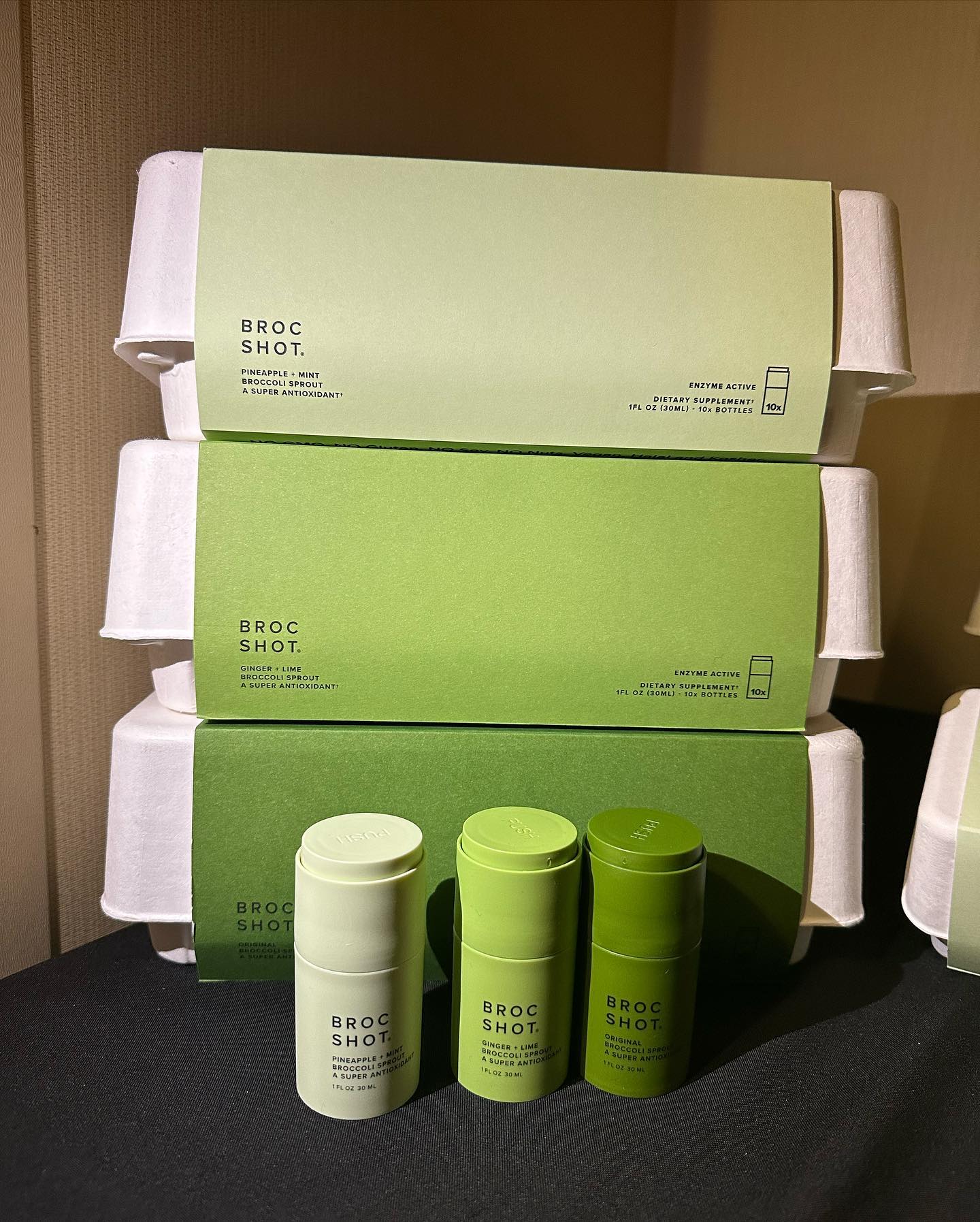
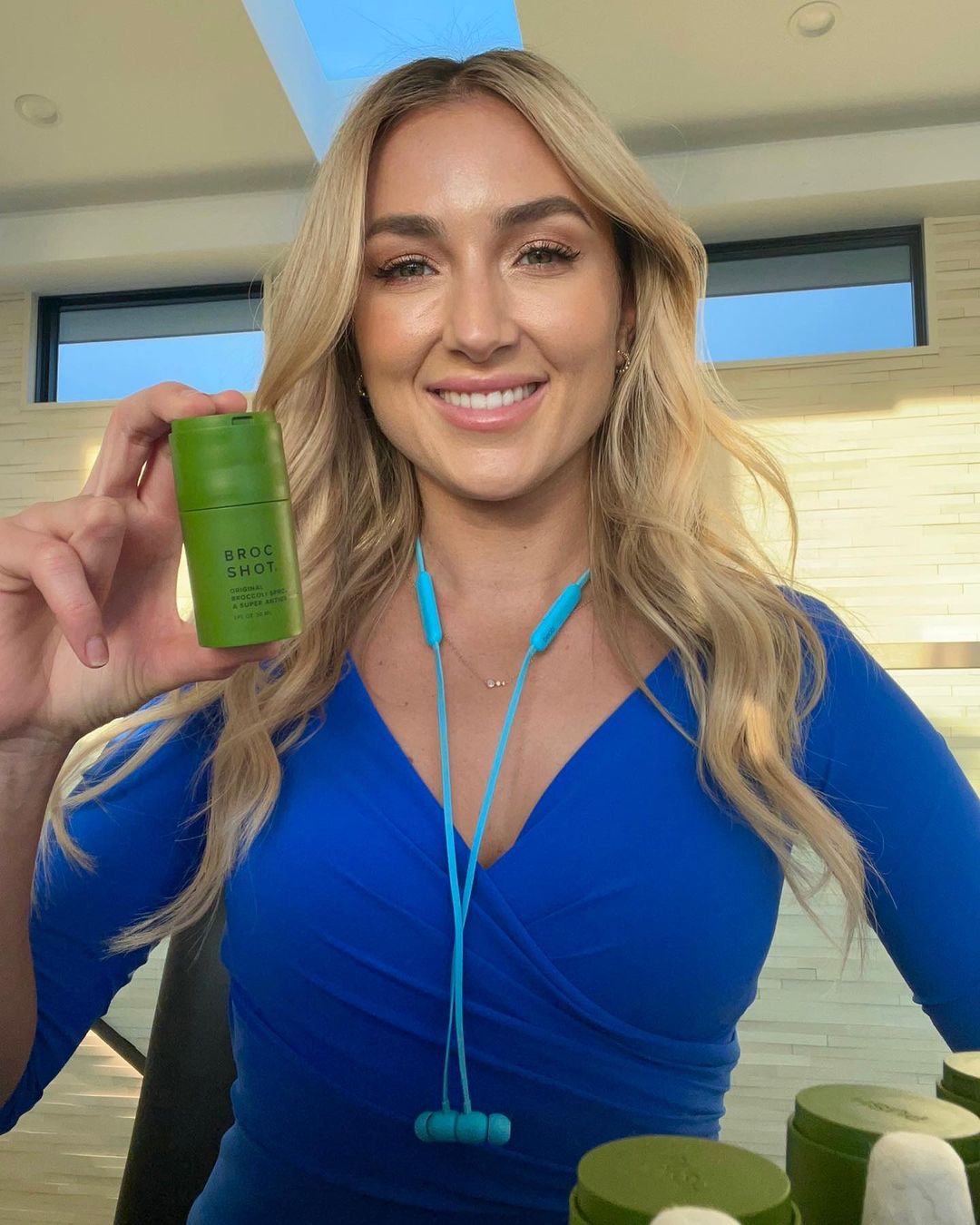
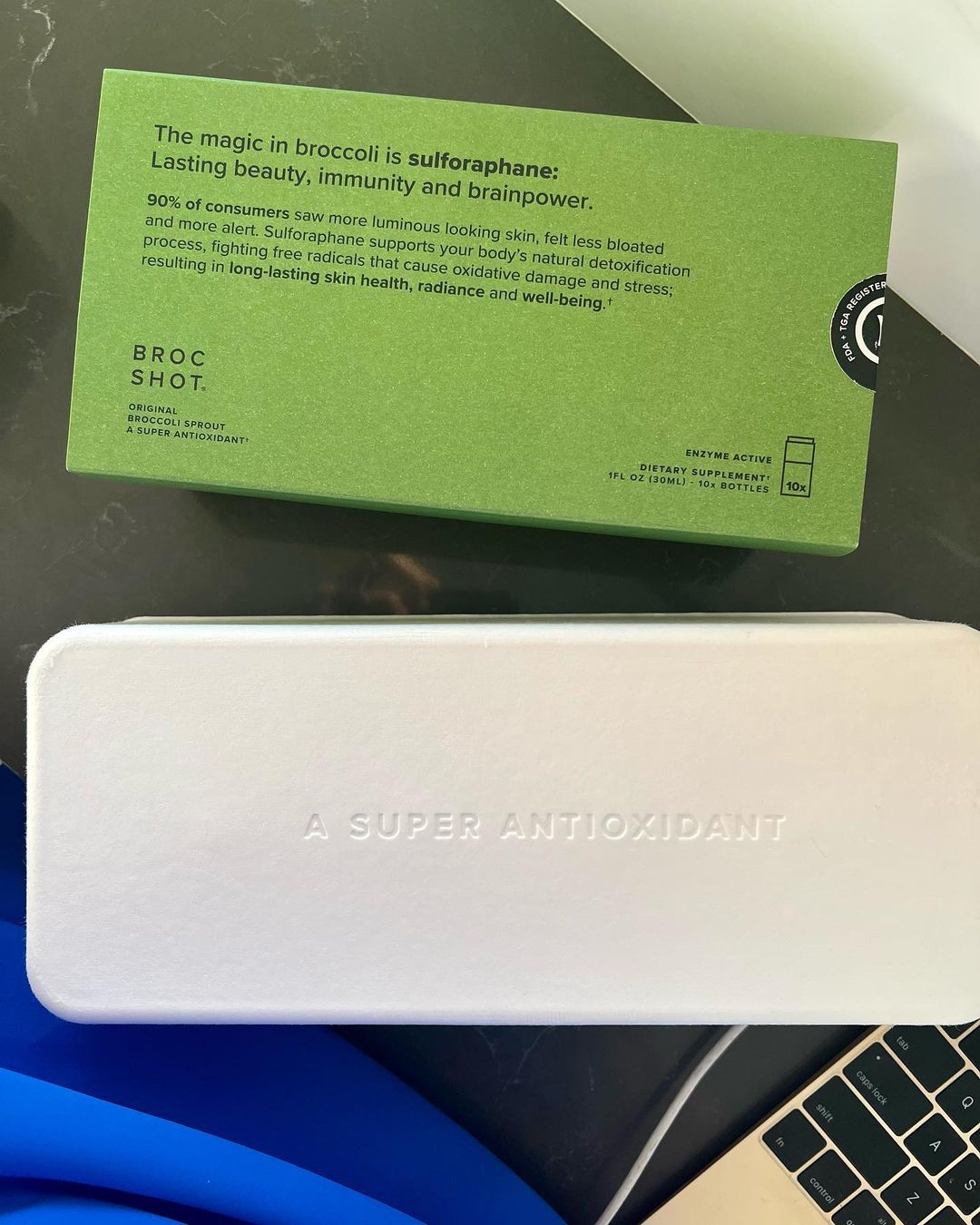
Resources:
3. M.M. Dias et al., “Anti-Inflammatory Activity of Polyphenolics from Açai
(Euterpe oleracea Martius) in Intestinal Myofibroblasts CCD-18Co Cells,” Food
& Function, vol. 6, no. 10 (October 2015): 3249−56, doi: 10.1039/c5fo00278h.
5. S.S. Dutta, “Hippocampus Functions,” News-Medical (August 20, 2019),
https://www.news-medical.net/health/Hippocampus-Functions.aspx.
7. G. Sandrini et al., “Effectiveness of Ibuprofen-Arginine in the Treatment
of Acute Migraine Attacks,” International Journal of Clinical Pharmacology
Research, vol. 18, no. 3 (1998): 145–50, PMID: 9825271.
8. J.R. McKnight et al., “Beneficial Effects of L-Arginine on Reducing Obesity:
Potential Mechanisms and Important Implications for Human Health,”
Amino Acids, vol. 39, no. 2 (2010): 349–57, doi: 10.1007/s00726-010-0598-z.
10. D. Christmas, S. Hood, and D. Nutt. “Potential Novel Anxiolytic Drugs,”
Current Pharmaceutical Design, vol. 14, no. 33 (2008): 3534–46, doi:10.2174/138161208786848775.
11. “What Is Serotonin and What Does It Do?” Medical News Today (accessed
April 29, 2020), https://www.medicalnewstoday.com/articles/232248#what-is-serotonin?
13. A.C. Nobre, A. Rao, and G.N. Owen. “L-Theanine, a Natural Constituent in
Tea, and Its Effect on Mental State,” Asia Pacific Journal of Clinical Nutrition,
vol. 17, supp. 1 (2008): 167–8, PMID: 18296328.
14. F.L. Sakamoto et al., “Psychotropic Effects of L-theanine and Its Clinical
Properties: From the Management of Anxiety and Stress to a Potential Use in
Schizophrenia,” Pharmacological Research, vol. 147 (September 2019): 104395,
doi: 10.1016/j.phrs.2019.104395.
15. T.S. Sathyanarayana Rao and V.K. Yeragani, “Hypertensive Crisis and
Cheese,” Indian Journal of Psychiatry, vol. 51, no. 1 (January–March 2009):
65–6, doi: 10.4103/0019-5545.44910.
16. “Compound Summary: Tyrosine,” U.S. National Library of Medicine (accessed April 10, 2020), https://pubchem.ncbi.nlm.nih.gov/compound/L-tyrosine; J.D. Fernstrom and M.H. Fernstrom, “Tyrosine, Phenylalanine, and Catecholamine Synthesis and Function in the Brain,” Journal of Nutrition,
vol. 137, no. 6, supp. 1 (June 2007): 1539S–47S, doi: 10.1093/jn/137.6.1539S.
19. Report of a Joint WHO/FAO/UNU Expert Consultation, “Protein and Amino
Acid Requirements in Human Beings,” World Health Organization (2002),
https://apps.who.int/iris/handle/10665/43411.
20. Gavin Van De Walle, “Tyrosine: Benefits, Side Effects and Dosage,” Healthline
(February 1, 2018), https://www.healthline.com/nutrition/tyrosine.
21. K. Chandrasekhar, J. Kapoor, and S. Anishetty. “A Prospective, Randomized Double-Blind, Placebo-Controlled Study of Safety and Efficacy of a High-Concentration Full-Spectrum Extract of Ashwagandha Root in Reducing Stress and Anxiety in Adults,” Indian Journal of Psychological Medicine, vol. 34,
no. 3 (July 2012): 255–62, doi: 10.4103/0253-7176.106022.
22. S.R. Fauce et al., “Telomerase-Based Pharmacologic Enhancement of Antiviral
Function of Human CD8+ T Lymphocytes,” Journal of Immunology, vol. 181,
no. 10 (November 15, 2008): 7400–6, doi: 10.4049/jimmunol.181.10.7400.
23. B.R. Hoobler, “Symptomatology of Vitamin B Deficiency in Infants,” JAMA,
vol. 91, no. 5 (August 4, 1928): 307–10, doi: 10.1001/jama.1928.02700050013005.
24. “Vitamin B12: Fact Sheet for Consumers,” National Institutes of Health,
Office of Dietary Supplements (accessed April 9, 2020), https://ods.od.nih
.gov/factsheets/VitaminB12-Consumer.
25. L.M. Young et al., “A Systematic Review and Meta-Analysis of B Vitamin
Supplementation on Depressive Symptoms, Anxiety, and Stress: Effects on
Healthy and ‘At-Risk’ Individuals,” Nutrients, vol. 11, no. 9 (September 16,
2019): 2232, doi: 10.3390/nu11092232.
39. B. Takase et al., “Effect of Chronic Stress and Sleep Deprivation on Both
Flow-Mediated Dilation in the Brachial Artery and the Intracellular
Magnesium Level in Humans,” Clinical Cardiology, vol. 27, no. 4 (April 27,2004): 223–7, doi: 10.1002/clc.4960270411.
40. G. Grases et al., “Anxiety and Stress Among Science Students: Study of
Calcium and Magnesium Alterations,” Magnesium Research, vol. 19, no. 2
(June 2006): 102–6, PMID: 16955721.
41. H.F. Chen and H.M. Su, “Exposure to a Maternal N-3 Fatty Acid-Deficient Diet During Brain Development Provokes Excessive Hypothalamic-Pituitary-Adrenal Axis Responses to Stress and Behavioral Indices of Depression and Anxiety in Male Rat Offspring Later in Life,” Journal of
Nutritional Biochemistry, vol. 24, no. 1 (January 2013): 70–80, doi: 10.1016/j.
jnutbio.2012.02.006.
43. M.A. Pérez, G. Terreros, and A. Dagnino-Subiabre, “Long-Term Omega-3 Fatty
Acid Supplementation Induces Anti-Stress Effects and Improves Learning in Rats,” Behavioral and Brain Functions, vol. 9 (June 14, 2013): 25, doi:10.1186/1744-9081-9-25; H.F. Chen and H.M. Su, “Fish Oil Supplementation of Maternal Rats on an N-3 Fatty Acid-Deficient Diet Prevents Depletion of
Maternal Brain Regional Docosahexaenoic Acid Levels and has a Postpartum
Anxiolytic Effect,” Journal of Nutritional Biochemistry, vol. 23, no. 3 (March2013): 299–305, doi: 10.1016/j.jnutbio.2010.12.010; A. Wu et al., “Curcumin Boosts DHA in the Brain: Implications for the Prevention of Anxiety Disorders,” Biochimica et Biophysica Acta, vol. 1852, no. 5 (May 2015): 951–
61, doi: 10.1016/j.bbadis.2014.12.005.
53. K.L. Brookie, G.I. Best, and T.S. Conner. “Intake of Raw Fruits and Vegetables
Is Associated with Better Mental Health Than Intake of Processed Fruits and Vegetables,” Frontiers in Psychology, vol. 9 (2018): 487, doi: 10.3389/fpsyg.2018.00487.


